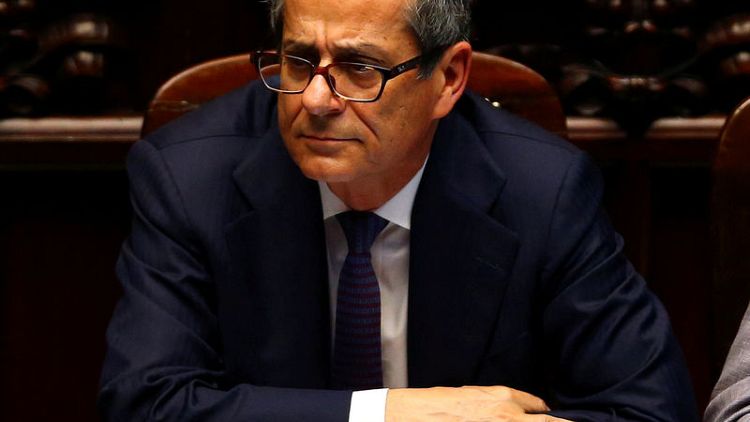By Steve Scherer
ROME (Reuters) - Investments will fuel Italian economic growth over the next two years and the debt level will be put on a downward path despite a significant increase in the budget deficit, Economy Minister Giovanni Tria said on Sunday.
Italy's ruling parties -- the anti-establishment 5-Star Movement and the right-wing League -- last week proposed a 2019 deficit of 2.4 percent of gross domestic product (GDP), three times the previous administration's target.
Deputy Prime Minister and 5-Star leader Luigi Di Maio hailed the move as the basis for a "people's budget" that would include a minimum income for the poor that would "abolish poverty".
However, the announcement rattled markets, prompting a bond sell-off and a rout of banking stocks. It also set up a clash with the European Commission, which monitors and enforces EU fiscal rules.
But Tria, an economist who belongs to neither ruling party, said that the Commission and markets should be reassured once they have a clear picture of next year's budget, due to be presented by Oct. 20.
"My hope is that by explaining the budget that we are preparing and the tools we plan to use to reach our main objective, which is growth, that the fears will cease," Tria said in an interview with Il Sole 24 Ore newspaper.
The deficit level "is absolutely not a challenge to Europe," Tria added.
These were Tria's first comments since Thursday, when the ruling parties quashed his attempts to keep the deficit under 2 percent of GDP next year, which some lawmakers said prompted the minister to offer his resignation.
Tria, who denied he had threatened to quit, will face initial scrutiny on Monday from his fellow eurozone finance ministers meeting in Luxembourg.
The opposition centre-left Democratic Party held a rally in a central square in Rome on Sunday to protest against the budget and the government, prompting Di Maio to label them and newspapers that have criticised the budget the "enemies of Italy" in a blog post.
Italy's president and its central bank governor had warned on Saturday that the country's debt must remain sustainable.
GROWTH, INVESTMENTS
The new government, which took power in June, has yet to publish the full list of public finance and growth forecasts that will be the basis for next year's budget, but Tria said debt would decline by a percentage point of GDP for each of the next three years.
Italy's debt is the largest among the big European economies at about 131 percent of GDP. The government sees it falling to 127 percent of GDP in 2021, Tria said.
Debt will be reduced by boosting growth through investment, he added, forecasting next year's GDP would be 1.6 percent, higher than the 1.4 percent forecast in April.
In 2020, growth will accelerate to 1.7 percent compared with a previous forecast of 1.3 percent.
Current trend growth - without considering any budget stimulus - is only 0.9 percent for 2019, down from a previously forecast 1.4 percent, Tria said. A consensus of institutional forecasts puts growth at about 1.5 percent this year and close to 1 percent in 2019.
Debt reduction will be guaranteed by a mechanism that automatically cuts spending if growth falls short, Tria said.
An extraordinary investment plan will channel 0.2 percent of GDP, or about 3.4 billion euros, into public works next year, and the funding will double in 2020, Tria said.
In an interview with Corriere della Sera newspaper, Prime Minister Giuseppe Conte said a separate plan involving state-owned companies would see 38 billion euros ($44.1 billion)invested over the next 15 years.
All funds will be monitored by a special group set up in the prime minister's office, which will also have the job of cutting through red tape that has slowed investment in recent years.
In another newspaper interview, Cabinet Undersecretary Giancarlo Giorgetti told la Repubblica that there was still time to change the targets if necessary: "If something doesn't work... we will intervene."
(Reporting by Steve Scherer; Editing by Keith Weir)
